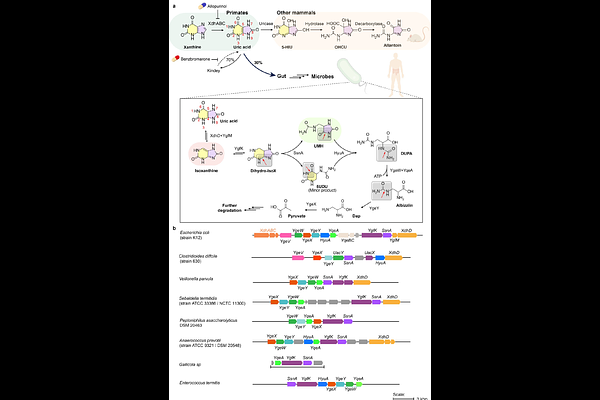A Reductive Uric Acid Degradation Pathway in Anaerobic Bacteria

A Reductive Uric Acid Degradation Pathway in Anaerobic Bacteria
Li, Z.; Meng, W.; Gao, Z.; Peng, W.; Zhang, J.; Wang, Y.; Wu, X.; Zhao, Z.; Zhang, C.; Tang, Z.; Nie, Z.; Wu, S.; Wu, B.; Tong, Y.; Hu, Y.; Hu, Z.; Wei, Y.; Zhang, Y.
AbstractUric acid is a key intermediate in purine degradation across diverse organisms, while its accumulation in humans leads to inflammation and gout disease. Aerobic organisms degrade uric acid via a well-known \"oxidative pathway\" involving dearomatization of the purine core catalyzed by uric acid oxidases or dehydrogenases. The ability to degrade uric acid is also widespread in anaerobic bacteria, including gut bacteria, although the mechanisms are incompletely understood. Here, we report the biochemical characterization of a recently identified uric acid degradation gene cluster from Escherichia coli, and show that it encodes a \"reductive pathway\" for uric acid degradation. In this pathway, uric acid is first reduced to isoxanthine (2,8-dioxopurine) by a xanthine dehydrogenase homolog (XdhD), followed by dearomatization of the purine core catalyzed by a flavin-dependent reductase (YgfK). Stepwise cleavage of the pyrimidine and imidazole rings forms 2,3-diureidopropionate, and stepwise cleavage of the 2- and 3-ureido groups then forms 2,3-diaminopropionate, which is cleaved by a pyridoxal 5\'-phosphate-dependent lyase (YgeX) to pyruvate and ammonia. Detection of isoxanthine in clinical serum samples suggests it is a physiologically relevant circulating metabolite. A probiotic E coli Nissle strain was engineered for constitutive overexpression of the gene cluster, and oral administration in a uricase-knockout hyperuricemic mouse model significantly reduced the serum uric acid level and alleviated associated kidney injury, suggesting a potential route towards uricolytic probiotics.